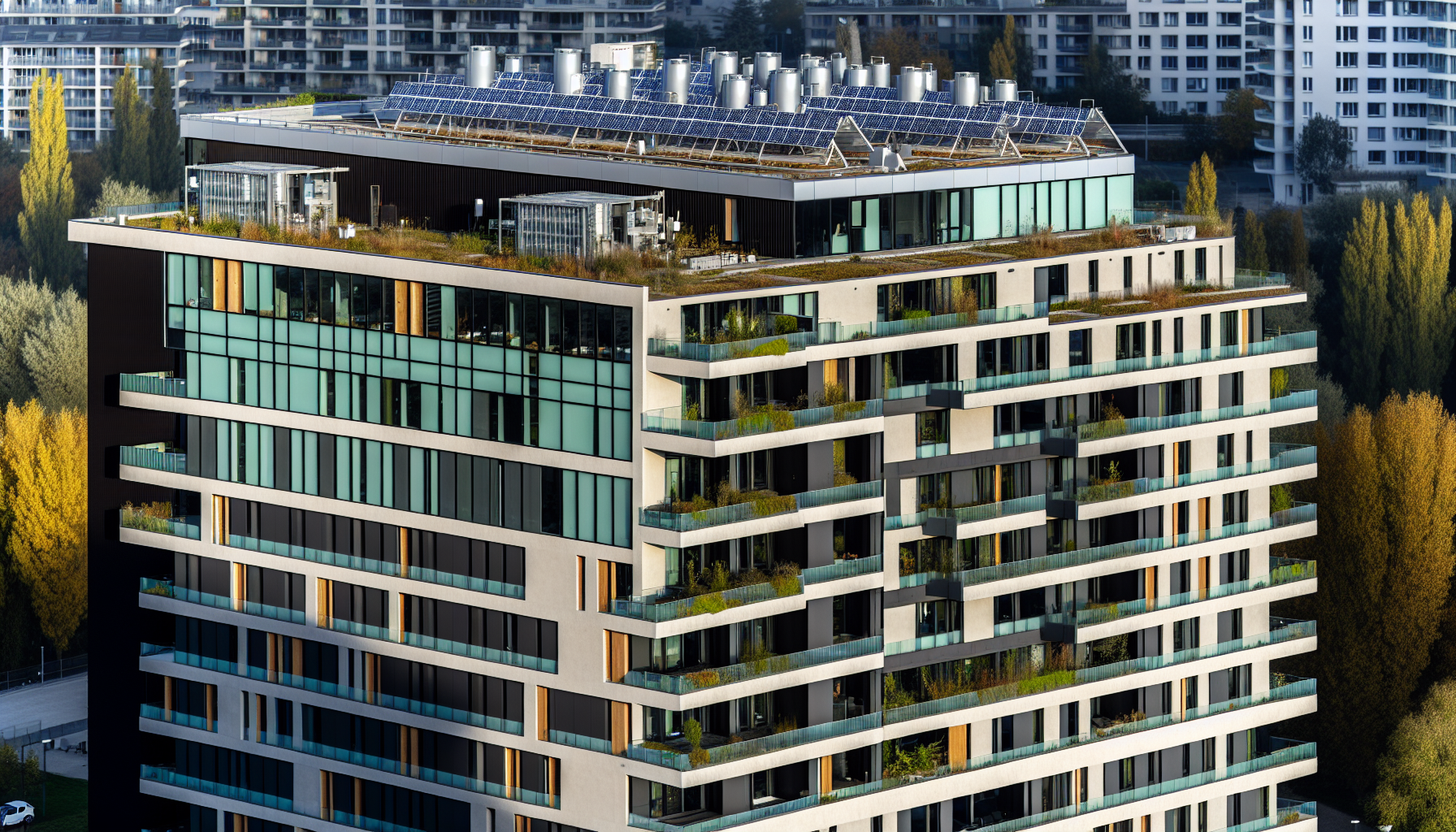As the kaleidoscope of real estate investing continues to rotate, intriguing patterns of opportunity emerge. A landscape once dominated by traditional property transactions is now a vibrant tapestry of sustainable development, innovative technology, shifting consumer preferences, alternative investment avenues, and global economic influences. With the future of real estate investing continuously evolving, the journey is as fascinating as the destination. Let’s embark on an exploration of this dynamic terrain.
 Sustainability has become central to the real estate market, instigating a shift towards green practices that are revolutionizing the industry. Sustainable development is setting the stage for the future of real estate investing, coloring it with shades of green. Eco-friendly properties are no longer a fad; they are a necessity, offering a symbiotic relationship between the environment and the economy. With the integration of green building materials and energy-efficient designs, the real estate market is gearing up to cater to the growing demand for environmentally responsible living.
Modern real estate technologies are playing a pivotal role in this sustainability-driven transformation. They are powering an eco-conscious revolution, laying the foundation for green buildings, and paving the way for fractional property investment opportunities. With a focus on sustainability, real estate is no longer just about constructing homes; it’s about creating a greener future.
Sustainability has become central to the real estate market, instigating a shift towards green practices that are revolutionizing the industry. Sustainable development is setting the stage for the future of real estate investing, coloring it with shades of green. Eco-friendly properties are no longer a fad; they are a necessity, offering a symbiotic relationship between the environment and the economy. With the integration of green building materials and energy-efficient designs, the real estate market is gearing up to cater to the growing demand for environmentally responsible living.
Modern real estate technologies are playing a pivotal role in this sustainability-driven transformation. They are powering an eco-conscious revolution, laying the foundation for green buildings, and paving the way for fractional property investment opportunities. With a focus on sustainability, real estate is no longer just about constructing homes; it’s about creating a greener future.
 The impact of technology stretches beyond smart homes and energy efficiency. It’s causing significant changes in real estate investing, leading to advancements that seemed unthinkable a decade ago. Virtual property tours, blockchain transactions, and decisions based on data analysis have created new opportunities for investors, affecting investment strategies and property values.
In this period of digital transformation, real estate professionals are utilizing technology to enhance their services and provide uninterrupted experiences in real estate transactions. Technological advancements have blurred the boundaries between traditional sectors in the industry, enabling users to invest without geographical constraints. Embracing these real estate technology trends, including real estate tech trends, is no longer a choice but a necessity for real estate companies who aim to stay ahead.
The impact of technology stretches beyond smart homes and energy efficiency. It’s causing significant changes in real estate investing, leading to advancements that seemed unthinkable a decade ago. Virtual property tours, blockchain transactions, and decisions based on data analysis have created new opportunities for investors, affecting investment strategies and property values.
In this period of digital transformation, real estate professionals are utilizing technology to enhance their services and provide uninterrupted experiences in real estate transactions. Technological advancements have blurred the boundaries between traditional sectors in the industry, enabling users to invest without geographical constraints. Embracing these real estate technology trends, including real estate tech trends, is no longer a choice but a necessity for real estate companies who aim to stay ahead.
 The real estate market mirrors the evolving preferences of consumers. The demand for spaces conducive to remote work and the shift between urban and suburban living are influencing real estate investments and forming the rental markets. Understanding these preferences is not just about keeping up with the times; it’s about anticipating the future and using these insights to make strategic investment decisions.
The emergence of co-living spaces represents yet another trend influenced by evolving consumer preferences. These shared living arrangements cater to the needs of millennials and young professionals, offering affordable and flexible living solutions. As these trends continue to evolve, investors who stay ahead of the curve will be the ones who reap the rewards.
The real estate market mirrors the evolving preferences of consumers. The demand for spaces conducive to remote work and the shift between urban and suburban living are influencing real estate investments and forming the rental markets. Understanding these preferences is not just about keeping up with the times; it’s about anticipating the future and using these insights to make strategic investment decisions.
The emergence of co-living spaces represents yet another trend influenced by evolving consumer preferences. These shared living arrangements cater to the needs of millennials and young professionals, offering affordable and flexible living solutions. As these trends continue to evolve, investors who stay ahead of the curve will be the ones who reap the rewards.
 In the domain of real estate investing, the less obvious route often reveals unexpected opportunities. Alternative investment options in real estate, like crowdfunding platforms and Real Estate Investment Trusts (REITs), are becoming popular among investors due to their ease of access and potential for diversification.
These options offer varying levels of risk and reward, providing investors with a wider range of choices. Whether it’s pooling resources to invest in larger projects through crowdfunding platforms or enjoying the liquidity and regular income offered by REITs, these alternative investment options open up new avenues for investors in the real estate market.
In the domain of real estate investing, the less obvious route often reveals unexpected opportunities. Alternative investment options in real estate, like crowdfunding platforms and Real Estate Investment Trusts (REITs), are becoming popular among investors due to their ease of access and potential for diversification.
These options offer varying levels of risk and reward, providing investors with a wider range of choices. Whether it’s pooling resources to invest in larger projects through crowdfunding platforms or enjoying the liquidity and regular income offered by REITs, these alternative investment options open up new avenues for investors in the real estate market.
 In the fluid world of real estate investing, adaptability is just as important as predictability. As trends evolve and new opportunities arise, investors who can adapt their strategies are the ones who will thrive. Here are some ways to stay adaptable in real estate investing:
In the fluid world of real estate investing, adaptability is just as important as predictability. As trends evolve and new opportunities arise, investors who can adapt their strategies are the ones who will thrive. Here are some ways to stay adaptable in real estate investing:
Key Takeaways
- Sustainable development, green building materials and energy efficiency are revolutionizing the real estate industry.
- Technology is providing new opportunities for investors with virtual property tours, blockchain transactions and data analysis.
- Embracing technology while staying informed of market trends is essential to capitalize on investment opportunities in a changing landscape.
Sustainable Development in Real Estate
 Sustainability has become central to the real estate market, instigating a shift towards green practices that are revolutionizing the industry. Sustainable development is setting the stage for the future of real estate investing, coloring it with shades of green. Eco-friendly properties are no longer a fad; they are a necessity, offering a symbiotic relationship between the environment and the economy. With the integration of green building materials and energy-efficient designs, the real estate market is gearing up to cater to the growing demand for environmentally responsible living.
Modern real estate technologies are playing a pivotal role in this sustainability-driven transformation. They are powering an eco-conscious revolution, laying the foundation for green buildings, and paving the way for fractional property investment opportunities. With a focus on sustainability, real estate is no longer just about constructing homes; it’s about creating a greener future.
Sustainability has become central to the real estate market, instigating a shift towards green practices that are revolutionizing the industry. Sustainable development is setting the stage for the future of real estate investing, coloring it with shades of green. Eco-friendly properties are no longer a fad; they are a necessity, offering a symbiotic relationship between the environment and the economy. With the integration of green building materials and energy-efficient designs, the real estate market is gearing up to cater to the growing demand for environmentally responsible living.
Modern real estate technologies are playing a pivotal role in this sustainability-driven transformation. They are powering an eco-conscious revolution, laying the foundation for green buildings, and paving the way for fractional property investment opportunities. With a focus on sustainability, real estate is no longer just about constructing homes; it’s about creating a greener future.
Green Building Materials
As global interest in sustainability grows, green building materials are becoming fundamental to the contemporary real estate industry. These eco-friendly materials, including recycled and renewable resources, are helping to reduce the environmental footprint of buildings. But their benefits don’t stop at being environmentally friendly. They also offer economic advantages, such as reduced energy consumption and lower maintenance costs. It’s a win-win situation for both the planet and the property owners. Smart building technologies are enhancing the sustainability quotient of these green buildings. Intelligent building management systems utilize these technologies to effectively manage energy, water, and waste consumption, thereby optimizing the environmental footprints of properties. Simply put, green building materials are more than a trend; they are altering the structure of the real estate industry.Energy Efficiency and Smart Home Technology
The journey towards sustainable development in real estate is driven by another influential component – energy efficiency combined with smart home technology. The integration of energy-efficient designs and devices into homes, like smart thermostats and energy-saving appliances, is revolutionizing the real estate market, making homes smarter and greener. The wonders of Artificial Intelligence and Internet of Things (IoT) have made their way into the realm of real estate, providing innovative solutions for energy management and home automation. These technologies offer substantial cost savings for property owners and appeal to eco-conscious buyers, enhancing the value of properties. Smart home technology isn’t just a luxury anymore; it is an essential component of today’s real estate sector.The Impact of Technology on Real Estate Investing
 The impact of technology stretches beyond smart homes and energy efficiency. It’s causing significant changes in real estate investing, leading to advancements that seemed unthinkable a decade ago. Virtual property tours, blockchain transactions, and decisions based on data analysis have created new opportunities for investors, affecting investment strategies and property values.
In this period of digital transformation, real estate professionals are utilizing technology to enhance their services and provide uninterrupted experiences in real estate transactions. Technological advancements have blurred the boundaries between traditional sectors in the industry, enabling users to invest without geographical constraints. Embracing these real estate technology trends, including real estate tech trends, is no longer a choice but a necessity for real estate companies who aim to stay ahead.
The impact of technology stretches beyond smart homes and energy efficiency. It’s causing significant changes in real estate investing, leading to advancements that seemed unthinkable a decade ago. Virtual property tours, blockchain transactions, and decisions based on data analysis have created new opportunities for investors, affecting investment strategies and property values.
In this period of digital transformation, real estate professionals are utilizing technology to enhance their services and provide uninterrupted experiences in real estate transactions. Technological advancements have blurred the boundaries between traditional sectors in the industry, enabling users to invest without geographical constraints. Embracing these real estate technology trends, including real estate tech trends, is no longer a choice but a necessity for real estate companies who aim to stay ahead.
Virtual Property Tours and Blockchain Transactions
One of the most remarkable innovations in real estate technology is virtual property tours, powered by advanced real estate software and virtual reality. This feature brings convenience and transparency to the forefront of property buying and selling. It allows potential buyers to:- Explore properties from anywhere in the world
- Get a realistic sense of the property’s layout and features
- Save time by narrowing down their options before visiting in person
Data-Driven Decision Making
In the age of big data, decision-making based on data analysis has become a significant asset in real estate investing. Advanced tools and platforms offer valuable insights and predictive modeling, enabling investors to make informed decisions. The ability to analyze complex data sets and identify market trends has revolutionized the way investments are made. Not only does this approach reduce risks, but it also uncovers potential investment opportunities that may have otherwise gone unnoticed. With the power of data analytics at their fingertips, investors can navigate the real estate market with confidence, making strategic choices that yield high returns. In essence, data-driven decision-making is turning real estate investing into a science.Changing Consumer Preferences and Real Estate Investing
 The real estate market mirrors the evolving preferences of consumers. The demand for spaces conducive to remote work and the shift between urban and suburban living are influencing real estate investments and forming the rental markets. Understanding these preferences is not just about keeping up with the times; it’s about anticipating the future and using these insights to make strategic investment decisions.
The emergence of co-living spaces represents yet another trend influenced by evolving consumer preferences. These shared living arrangements cater to the needs of millennials and young professionals, offering affordable and flexible living solutions. As these trends continue to evolve, investors who stay ahead of the curve will be the ones who reap the rewards.
The real estate market mirrors the evolving preferences of consumers. The demand for spaces conducive to remote work and the shift between urban and suburban living are influencing real estate investments and forming the rental markets. Understanding these preferences is not just about keeping up with the times; it’s about anticipating the future and using these insights to make strategic investment decisions.
The emergence of co-living spaces represents yet another trend influenced by evolving consumer preferences. These shared living arrangements cater to the needs of millennials and young professionals, offering affordable and flexible living solutions. As these trends continue to evolve, investors who stay ahead of the curve will be the ones who reap the rewards.
Remote Work-Friendly Spaces
The increase in remote work has redefined what makes a property desirable. Today, a home is not just a place to rest and relax; it’s also a place to work. As more people embrace the flexibility of remote work, properties that offer dedicated workspaces and high-speed internet connections are in high demand. This trend has significantly impacted the property market, influencing both rental and sale prices. From homes with dedicated office spaces to communities with shared workspaces, properties that support remote work are attracting tenants and buyers, creating new opportunities for investors in the real estate market.Urban vs. Suburban Living Preferences
The ongoing debate between urban and suburban living affects more than personal preference; it has a direct impact on property investment choices. While some investors may opt for urban properties for their higher rental yields, others may choose suburban areas for their long-term capital appreciation potential. Recent trends indicate a shift towards suburbs, driven by factors like lower living costs, larger properties, and a slower-paced lifestyle. However, the allure of city life, with its cultural attractions and job opportunities, continues to draw a significant portion of the population. Navigating these trends and understanding regional preferences can help investors make strategic decisions that yield lucrative returns.Rise of Co-Living Spaces
The emergence of co-living spaces reflects the evolving nature of real estate. These shared housing arrangements cater to the needs of millennials and young professionals who seek affordable and flexible living arrangements. With shared amenities and a sense of community, co-living spaces offer a unique living experience that’s attracting a growing demographic. For investors, this trend presents new opportunities. It opens up a new market segment that promises higher rental yields and lower vacancy rates. As more people embrace the concept of shared living, investing in co-living spaces can prove to be a strategic move in the evolving real estate landscape.Alternative Real Estate Investment Options
 In the domain of real estate investing, the less obvious route often reveals unexpected opportunities. Alternative investment options in real estate, like crowdfunding platforms and Real Estate Investment Trusts (REITs), are becoming popular among investors due to their ease of access and potential for diversification.
These options offer varying levels of risk and reward, providing investors with a wider range of choices. Whether it’s pooling resources to invest in larger projects through crowdfunding platforms or enjoying the liquidity and regular income offered by REITs, these alternative investment options open up new avenues for investors in the real estate market.
In the domain of real estate investing, the less obvious route often reveals unexpected opportunities. Alternative investment options in real estate, like crowdfunding platforms and Real Estate Investment Trusts (REITs), are becoming popular among investors due to their ease of access and potential for diversification.
These options offer varying levels of risk and reward, providing investors with a wider range of choices. Whether it’s pooling resources to invest in larger projects through crowdfunding platforms or enjoying the liquidity and regular income offered by REITs, these alternative investment options open up new avenues for investors in the real estate market.
Crowdfunding Platforms
Crowdfunding has revolutionized the landscape of real estate investing. These platforms allow investors to:- Pool resources
- Invest in larger real estate projects that were previously out of reach for individual investors
- Have the potential for higher returns
- Achieve portfolio diversification
Real Estate Investment Trusts (REITs)
Real Estate Investment Trusts (REITs) offer investors a passive way to invest in the real estate market. These trusts own and operate income-generating real estate assets, offering investors the opportunity to earn regular income in the form of dividends. REITs offer the liquidity of owning a stock with the potential for regular income, making them an attractive option for many investors. However, as with any investment, REITs come with their own set of risks and rewards. Investors must carefully consider factors like market volatility, interest rate risks, and the performance of the underlying properties before investing in REITs.Economic Factors and Regulatory Changes Affecting Real Estate Investing
Economic changes are continually reshaping the real estate investing landscape, making it crucial for investors to stay informed about the latest real estate deals. Factors such as interest rates, inflation, and potential regulatory changes can have a profound impact on investment strategies and property values. In the game of real estate investing, staying informed and adaptable is the key to success. Understanding the potential impacts of these economic and regulatory changes is necessary to navigate them. From the influence of interest rates on property values to the implications of potential tax reforms, having a finger on the pulse of these factors can help investors steer their investment strategies in the right direction.Interest Rates and Inflation
Interest rates and inflation are two key economic factors that can significantly affect real estate investing. Changes in interest rates can impact the affordability of property loans, influencing buyer demand and property prices. Similarly, fluctuations in inflation rates can affect the purchasing power of potential buyers, impacting property values and rental rates. Understanding these economic indicators is crucial for any real estate investor. By keeping an eye on the trends and forecasts for interest rates and inflation, investors can make informed decisions about when to buy or sell properties and how to align their investment strategies with the prevailing economic conditions.Potential Regulatory Changes
Regulatory changes can have a profound impact on the real estate market. From tax reforms to zoning laws, these changes can affect property values, rental rates, and investment opportunities. For instance, changes in zoning regulations can influence the potential uses of a property, affecting its investment potential. Staying informed about potential regulatory changes is crucial for any real estate investor. By understanding the potential impacts of these changes, investors can adapt their investment strategies to mitigate risks and seize new opportunities. In the ever-evolving landscape of real estate investing, adaptability is the name of the game.Adapting to the Future of Real Estate Investing
 In the fluid world of real estate investing, adaptability is just as important as predictability. As trends evolve and new opportunities arise, investors who can adapt their strategies are the ones who will thrive. Here are some ways to stay adaptable in real estate investing:
In the fluid world of real estate investing, adaptability is just as important as predictability. As trends evolve and new opportunities arise, investors who can adapt their strategies are the ones who will thrive. Here are some ways to stay adaptable in real estate investing:
- Embrace new technologies
- Stay informed about market trends
- Network with other investors and professionals in the industry
- Continuously educate yourself and stay up to date with industry news and developments































